The most important trends for the renovation, energy saving, landscaping and lighting of hotel units are being presented during Xenia 2023.
We discussed Hotel Design & Business Planning
The third and final day of The Red Spot Stage included interactive and targeted panels around Hotel Design & Business Planning. Moderator was Stavros Martinos (ek magazine).
The beginning was made by Grigoris Kotopoulis (Technical Director, EGREEN), Nikos Gliatis (President of the Greek KNX Association), Stephan J. Clambaneva (Principal, Founder & Circular Innovation Officer, iD8trs) and Yannis Petrou (Technical Sales Manager, Vitex) who analyzed in detail the topic “Sustainability & Hotels”.
Grigoris Kotopoulis spoke about the importance of planting on the buildings’ roofs, as a result of which water is retained and the problems of high temperatures are addressed. He also mentioned that their company participated in several projects, most notably the Stavros Niarchos Foundation Cultural Center. Nikos Gliatis pointed out that in order for a building to be sustainable in terms of energy, it should take care of its “shell” and use more environmentally friendly technologies.
Stephan J. Clambaneva emphasized that we need a balanced holistic approach to sustainability and went on to analyze the terms sustainability and circularity. Finally, he spoke about sustainable strategy, methodology and experiences. Yiannis Petrou referred to the specialization of Vitex which has to do with paints, external insulation systems, etc. He emphasized that they support society and man, while finally he gave some examples of materials that you can apply to external surfaces under special conditions (due to climate change). The panel titled “Wellness, Spa & Fitness” followed afterwards, with speakers Kostas Athanasiou (Owner of Idolo Consulting Beauty & Spa), Irini Alexopoulou (Hospitality Sales Manager, JHT) and Elpida Miskaki (Owner, Acrilan Water Experience).
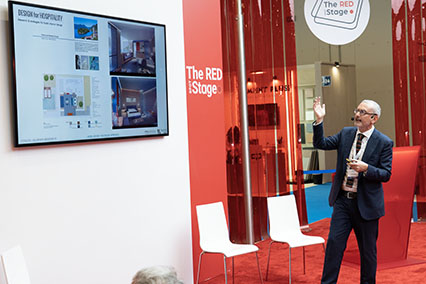
Francesco Scullica
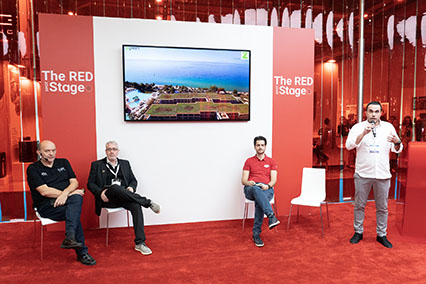
Grigoris Kotopoulis, Nikos Gliatis, Stephan J. Clambaneva, Yannis Petrou
Kostas Athanasiou started by saying a few words about the company, pointing out at the same time that after the covid period, the demand for spas in the hotel sector has increased dramatically, making the sector the fastest growing worldwide at the moment. After all, according to him, the modern way of life requires the provision of such services in hotels, now escaping from the vanity part. Irini Alexopoulou underlined the need for people to exercise while also having good memories, with the company actively contributing to this through the modern and stylish machines it is launching. The company is perhaps the largest in the world in its field, while for the last 10 years it has also been active in Greece. Elpida Miskaki noted that in her company they take the hotelier’s needs and make them as custom as possible.
Then, Konstantinos Pantelis (Owner, Anodos Consulting), Konstantinos Vamvakas (CEO, VK Premium) and Ioulia Akrivopoulou (AkriMan Company Manager) spoke about the topic “NSRF-Subsidies”. Konstantinos Pantelis analyzed the methods of financing, the development law 4887/22 and spoke about the NEW NSRF, which under certain conditions concern hotels, hotels inside traditional buildings and camping, self-catering accommodation, and rooms for rent. Finally, he analyzed bank financing tools, recovery fund loans and leader programs.
Konstantinos Vamvakas started by highlighting three main pillars of activity which are development programs, consulting services and medicinal cannabis. He emphasized that it is important that those interested have already started the program process, as these do not come out every year, with the last one being announced in 2018. Iulia Akrivopoulou referred to the program entitled “Improving modification of the accessibility of the Greek beaches” which has to do with people with mobility problems, who do not have access to the beach and who want to enjoy their holidays and the sea. She then highlighted the purpose of the action as well as some key points. Finally, she said a few words about the company AkriMan.
The curtain of The Red Spot Stage was closed a talk about Italian Design and more specifically: “How Italian Design has influenced hotel design?”. The speaker was Francesco Scullica (Architect, Head of Interior Design Program at School of Design of Politecnico di Milano) and the speech was coordinated and edited by Vana Toumazatou (Interior Designer). First, he made a special mention of his team and then referred to the areas of research and consulting. He then analyzed some aspects concerning the Italian approach and these are: Italian design approach, Research, Humanity, Details, Italian dimension and Luxury as quality. He also referred to the well-known and unexceptional three-factor scheme: places, products and services. Finally, he presented some impressive examples of Italian design as well as Hospitality Trends.
Sustainability at the heart of hotels
The second day at the Red Spot Stage was characterized by a series of “powerful” presentations on the topic of Creating Synergies or in other words, “from the idea to the final result” from the entire support team (researchers, investors, manufacturers, consultants, operators), so as to highlight a hotel project as a whole. The coordinator was Stavros Martinos, Architect (ek magazine).
The case study of Elounda Hills Resort, which has just started to be built, was presented by Mr. Dimitris Tsigos, Omniview Architect, Mr. Stephan J. Clambaneva, Sustainability Consultant Elounda Hills and Mr. Angelos Angelidakis CEO & Development Director Mirum Hellas, Construction Director at Elounda Hills. Mr. Angelidakis talked about the “work of everyone’s life”, as he described it, and spoked analytically about the marina, the Elounda Hills Hill Top Hotel and the residences, as well as what will follow in the coming years, always with the core values of viability and sustainability.
The harmony of the landscape and nature both in the cavernous parts of the hotel and above ground, the different from the usual approach to the pool and the spa and the creation of an experience on a human scale, were behind the basic architectural concept, according to Mr. Tsigos. The presentation of the project ended with by Mr. Clambaneva, who gave the context according to which a holistic approach and implementation of sustainability was made in three axes, strategy, process and experience, while the plan was based on 7 of the 17 sustainability goals of the United Nations. The goal is for sustainability to be a rejuvenating experience for guests during their stay.
Immediately after, the floor was taken by Mr. Nikos Peppas and Katerina Tsiolaki from Peppas N Architects office and Mr. Giorgos Dimitrakakis from Anysma Consulting Engineers, who analyzed the redesign of the building, Amalen Suites in Rethymnon. Guided by the creation of an overall experience based on the traditional culture and the mystical character, while offering all the facilities of a five-star hotel, Mrs. Tsiolaki referred to every detail behind the implementation of the redesign of an old building into a city hotel. Mr. Peppas emphasized the particularities of the project, as well as the special constructions carried out with the contribution of a network of craftsmen from Crete and other regions of Greece. A typical example are the old Turkish room locks, which were found in the old town of Rethymno and were made functional again by traditional craftsmen.
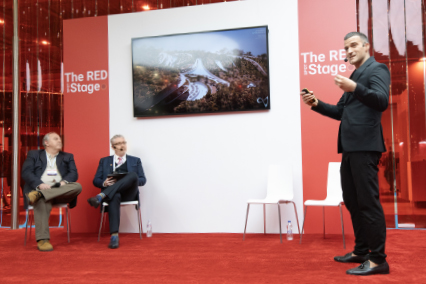
Dimitris Tsigkos, Stephan J. Clambaneva, Aggelos Aggelidakis
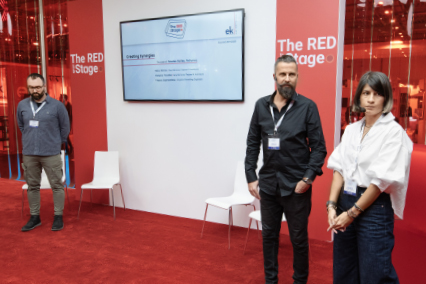
Nikos Peppas, Katerina Tsiolaki, George Dimitrakakis
The presentation was closed by Mr. Dimitrakakis who, through his work as a project engineer, shared information on how the cooling-heating issue of the building, as well as the hot water, was dealt both functionally and aesthetically. The trilogy of the case studies was closed by Ms. Dominiki Dadatsi, Not a Number Architects, and Eliza Zarifi, Graphic designer/Artist, Tres banal, with the presentation of MonAsty, Autograph Collection in Thessaloniki.
The ruins found at the site and the harmonization with the neighboring monastery of Agia Theodora, as well as the “living” history of the Byzantine era of Thessaloniki, formed the canvas on which this unique project was created. References to the Byzantine era are everywhere, from the choice of building materials to architectural elements such as alcoves, ceiling height and arches, along with arts such as wood engraving, mosaics and textiles, creating an atmosphere that is impressive but familiar to the visitor. The concept was carried over to all the operations of the hotel such as the menu, the selection of wines, the decoration of the rooms and other areas and as Ms. Zarifi explained afterwards, even to the design of logos and signage, where again characteristic symbols of Byzantium were used.
The day ended with the presentation of KNX: The international building automation standard. The scope and advantages of its correct application in the modern hotel, with Mr. Nikos Gliatis, President of the Hellenic KNX Association. With intense interest, the public watched a thorough analysis of the automations of the modern hotel, which contribute to the reduction of energy consumption, the better control of the orderly operation and the comfort of the guests. The president of the Hellenic KNX Association, based in Brussels, spoke about the companies located in Greece that manufacture KNX products, as well as the future plans of the Association, such as, among other things, to open the association and obtain representatives in universities, technical schools, building manufacturers, etc. Finally, he thoroughly referred to the international standard of building automation and the scope of its correct application which contributes to a number of advantages for modern hotel units.
When hospitality met modern design
The large number of attendees and interesting speeches fully characterized the first day of The Red Spot Stage, where Moderator was Stavros Martinos (ek magazine). At the beginning the Pnoe Breathing Life project in Heraklion was presented by Aria Lyroni (Architect, Cube Concept) and George Syrmos (Director, Pnoe Breathing Life). First, a report was made on the capacity of the hotel. More specifically, the total area reaches 15,576 sq.m. and the total construction of 3,115 sq.m., while it consists of 60 rooms, 3 types of rooms and 2 restaurants. Then, Mrs. Aroni proceeded with a historical review, stating that the hotel was first built in 1968, with the result that over the years it had become an existing and abandoned building, with many damages. The first visit to the hotel took place in 2021 and then the renewal process began. The 9 room buildings and the swimming pool were preserved, while a central building was added which houses a spa, restaurant and roof top. According to Mr. Syrmos, the goal was for the renovated hotel to offer a holistic experience to the customer with an emphasis on inner peace, relaxation and contact with nature. Then the demolition diagram and the renovated diagram were presented and finally an extensive description was given of all the spaces of Pnoe Breathing Life, which stands out for its modernist elements and the choice of raw materials such as marble and exposed concrete.
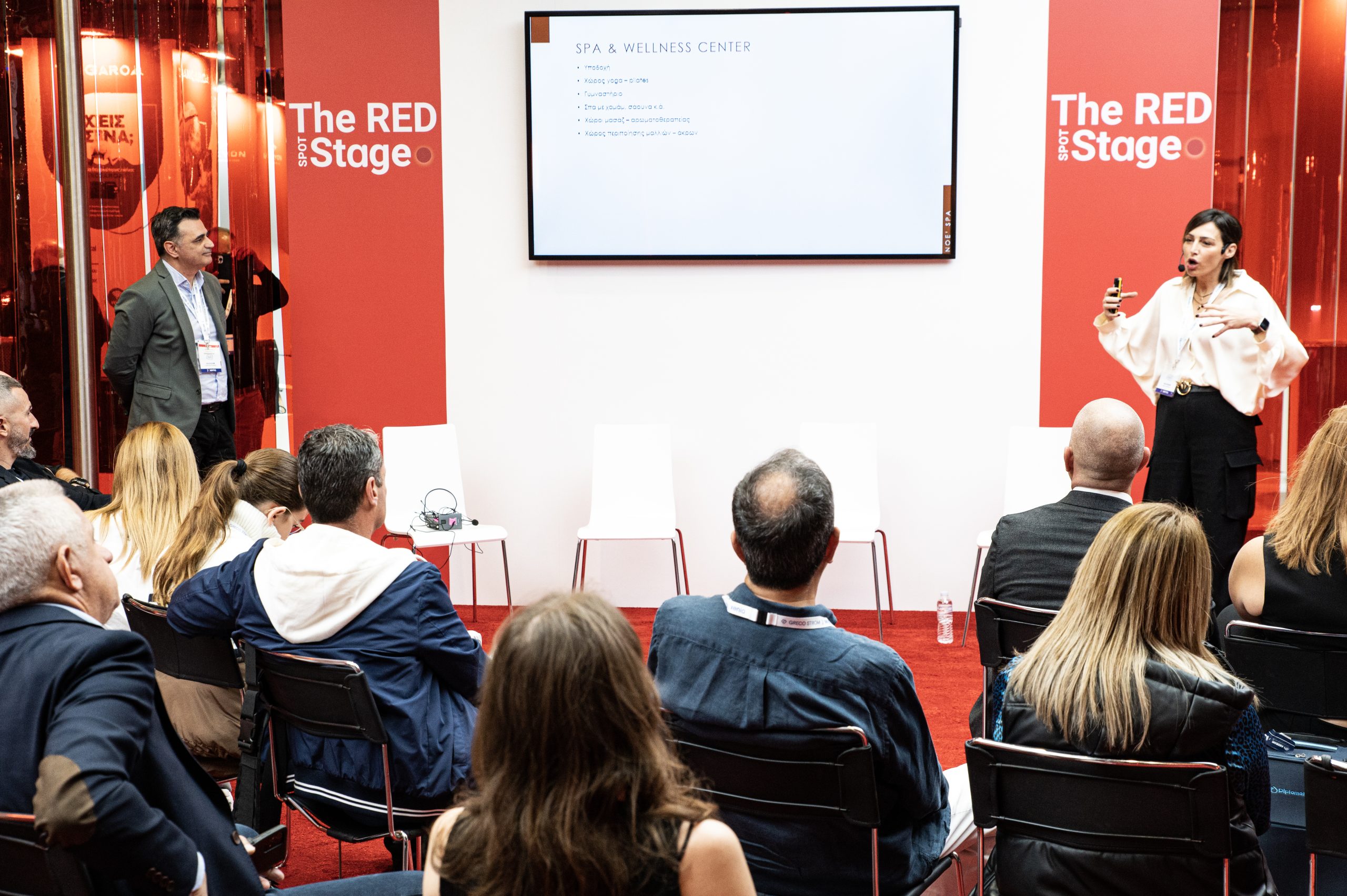
Aria Aroni, George Syrmos
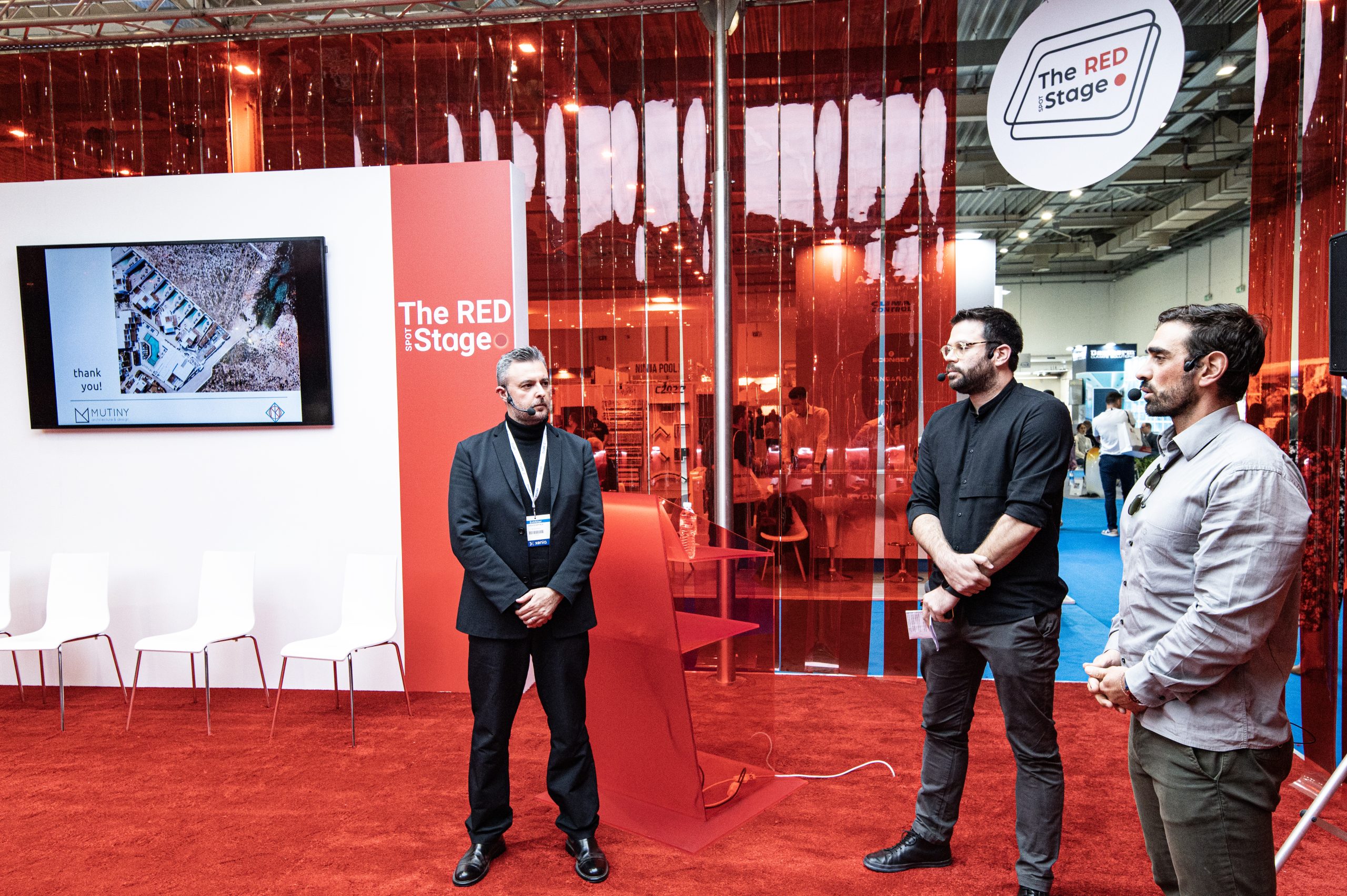
Stavros Martinos, Manos Gogoulis, Giorgos Giourtzidis
Then, Telemachos Andrianopoulos (Architect, Tense Architecture Network & Associate Professor NTUA) and Ioannis Kareliotis (Technical Director, Grivalia Hospitality) were positioned around Avant Mar in Paros. They explained that the basic idea was to completely reshape the two existing buildings and create a third building anew, all of this essentially being the renewed Avant Mar. The new suites and the common area facing the sea are just a few of the things that characterize the new hotel project. In fact, the volume of existing buildings has decreased significantly, with many parts of them having been demolished. Then they analyzed the floor plan of the hotel and gave a detailed description of its premises. Then, Mr. Kareliotis took the stand emphasizing that the main goal was to find something that will be able to generate value for the future and not in the short term. So, after research, they ended up at the specific place, which consists of a unique property, essentially a city hotel, something that did not exist in Paros until then. He then highlighted the difficulties the architect would have to face in adapting to today something that had his influences from the 90s. All of the above led to choosing Telemachos Andrianopoulos for the project, as he combined the possibility, aesthetics and culture.
This was followed by the speeches about Domes Noruz Mykonos with Maria Tsautari (Design Director, Urban Soul Project), Angelina Ioannou (Ergoline) and Jerry Diamantatos (Area Manager, Domes). Maria Tsavtari presented a timeline, starting with the first visit to the hotel in April 2022. The hotel is located in Agios Stefanos Mykonos, a not so premium area. They initially came into contact with 90s bad construction, so there was nothing they could step on to start the renewal. On the positive side, he emphasized the impressive sea view (without sea access, however) as well as the interesting ratio in the openings of the Cyclades. He also mentioned the existence of private courtyards, which they multiplied, while also placing specific objects in the space, which would transport the client to the microcosm of the Cyclades. He did not hesitate to underline the importance of the element of the pool, where they gave special emphasis. All of the above contributed to the emergence of the current 5-star Domes Noruz Mykonos, which opened its doors in June 2023 and includes, among other things, 38 suites. Jerry Diamantatos emphasized the difficulties they faced but also their satisfaction with the final result. Afterwards, Angelina Ioannou spoke of a tight schedule and a total change, as the only things that remained the same were the beams and columns. He continued with the difficulties that Mykonos presents for a construction company, while underlining the perfect cooperation with the whole team and the result that impressed them.
Then, Manos Gogoulis (Architect, Mutiny Architecture & Design) and Giorgos Giourtzidis (Director Of Operations of Andronis Group), analyzed all the details surrounding the Minois Luxury Boutique Hotel in Paros. Mr. Giourtzidis characterized Minois as the Benjamin project of the group’s family, noting that it operated last year under the current brand name. It is a new product in terms of design, planning and aesthetics. A lot of freedom was given to the architects and the result vindicated them. There was coherence and consistency in the collaboration, while the feedback they received from people was highly complimentary. Mosaics, textures, colors, tiles even on the tables, works of art characterize Minois, in which everything refers to the Mediterranean (not only the Greek).
Afterwards, Manos Gogoulis emphasized that the main axis was Greece and Cycladic architecture. In other words, they wanted to present a single whole, an overall proposal and through specific patterns of material selection, color palettes, etc. to be called upon to serve the whole concept. He himself pointed out that they wanted the hotel to have Mediterranean influences and not resemble another Boho proposal. Finally, he stated that an additional goal was to highlight the affinities that exist in so many different currents and to create a place for rest, entertainment, and vacations in a modern environment.
The curtain of the first day of The Red Spot Stage closed with the presentation entitled “Treasure or Trash? Papoutsanis and Coffe-Eco answer how the circular economy is applied in hotels!”. The speakers are Irini Hatziioakeimidou and Ariadni Zori from Papoutsanis company, as well as Alexis Pantziaros and Marios Vlachogiannis from Coffee-Eco.
Irini Hatziioakeimidou started by making a historical review of the company from 1870 until today, while she continued by pointing out Papoutsani’s vision for improving the world’s quality of life and their mission which is naturalness and sustainability. Finally, he pointed out that the company also operates abroad such as in North America and Australia, producing a total of 220,000,000 pieces of product annually and reaching 25,000,000 euros in investments. Then, Ariadni Zori analyzed Papoutsani’s portfolio, highlighting some key features of the products, while making a special mention of their partners in Greece and abroad.
Afterwards, Alexis Panziaros of Coffee-Eco, analyzed the role of the company and its scientific background, citing some key objectives. For his part, Marios Vlachogiannis explained the action of coffee in skincare, the need to invest in state-of-the-art equipment and the collaboration of their company with Coffee Island. Finally, Alexis Panziaros focused on their plans for cooperation with hotels for waste collection.
The impressive architectural design of the stage has been developed by Rena Sakellaridou with her architectural office, RS SPARCH. The organization of the program as well as the coordination of the event during the exhibition is carried out by the architectural magazine ek, with many years of experience in the fields of architecture, construction, and design.




































